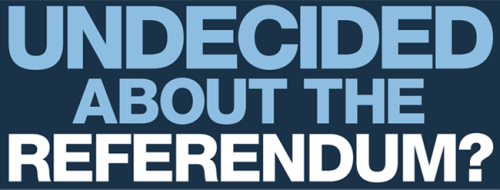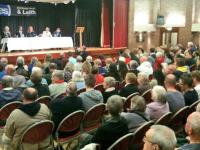 At the beginning of October someone tweeted me a link to Yes Edinburgh North & Leith‘s first public meeting, on 3rd October in the Halls on Henderson Street.
At the beginning of October someone tweeted me a link to Yes Edinburgh North & Leith‘s first public meeting, on 3rd October in the Halls on Henderson Street.
Unlike most Yes events, this one was billed explicitly, both in the header and in the text, as for undecided voters – so, unlike with most events organised by Yes Scotland, I felt free to go along. When I got there, about five minutes before the start, I found some Yes activists who’d come anyway were leaving, and people identifying themselves as undecided were being let in on a one-for-one basis (the hall was packed). I got a seat at the front that had been vacated by a Yes voter and was sitting next to two Yes voters who weren’t budging and who didn’t know Leith votes Labour.
Undecided voters in the audience will have the opportunity to ask a top panel – including Nicola Sturgeon and leading human rights lawyer Aamer Anwar – why they should vote Yes on September 18th next year.
 There were four speakers: Nicola Sturgeon for the SNP, Aamer Anwar for Labour – the only speaker who wasn’t a politician, Margo MacDonald – the woman the SNP tried to get rid of in 2003, still being elected as an Independent MSP for the Lothians – and Chas Booth, the Scottish Green councillor for Leith.
There were four speakers: Nicola Sturgeon for the SNP, Aamer Anwar for Labour – the only speaker who wasn’t a politician, Margo MacDonald – the woman the SNP tried to get rid of in 2003, still being elected as an Independent MSP for the Lothians – and Chas Booth, the Scottish Green councillor for Leith.
I didn’t know how I was going to vote on the 18th of September when I got there, and when I left I still didn’t know, and six weeks later I still don’t know – but I’d been convinced all over again by the event that I’ll have to make up my mind on my own – because nothing the Yes Scotland campaign or the Better Together campaign say is likely to be helpful.
Lesley Riddoch, though herself a solid Yes voter, puts it bluntly:
the thinking Scot does not want to hear “Just say yes” or “Independence is the normal condition for a country” (tell that to the happily and highly devolved Lander of Germany or the federal states of Canada) or “Independence gives us the chance to decide Scotland’s future” (it does, but devolution’s already given us a stack of choices we haven’t had the courage to use) or “Decisions made in Scotland are better than those made in Westminster” (the trams debacle and Holyrood Parliament scandal spring all too quickly to mind).
It’s not that these bald assertions are untrue. They just aren’t enough. Repeating formulaic arguments won’t cut it in this debate. “Heart” supporters of independence are already signed up. The gullible are least likely to vote. The majority of Scots want grown-up, credible reasons to up-end the constitutional arrangements of several lifetimes.
This, none of the speakers provided, though Chas Booth came closest: unsurprisingly, since the Scottish Greens have spent years of party time thinking about how Scotland could do better. And will continue to do so, I have no doubt, whichever way the referendum next September goes.
You can see for yourself what they all said: Yes Leith had organised a video record.
Chas Booth presented independence as the chance to create a better nation in Scotland. He mentioned a Leither who’d come to him for help, and presented a solid case that she was in less trouble than she might have been had she lived in England, because of Scottish legislation that was keeping the more vulnerable better protected.
And then he said: “Decisions that affect Scotland should be made in Scotland.”
Well yes: but why? Decisions that affect Scotland are also made in Westminster, in Brussels, in Strasbourg, in Geneva, in New York, in Vienna. Independence will not get rid of any of those other external-to-Scotland decisionmakers, nor, I assume, would Chas Booth wish it to – except, presumably, OPEC in Vienna.
Margo MacDonald presented the purely nationalist case for independence: fair enough, until the SNP were foolish enough to think they could drop her from the ballot in 2003 and replace her with someone more in the party mould (stale, pale, male….) she was a member of the Scottish National Party.
I will admit that Margo MacDonald put my back up almost immediately by arguing that she didn’t see why people who planned to vote “no” wanted to call themselves Scots. I have called myself Scottish, British, and European for decades: whichever way I vote in 2014 won’t change that.
By the nationalist argument, I mean the argument for voting yes that rests on the idea that things will magically become better because we are Scottish. We have as much capacity to screw things up as any other nation: I don’t believe in arguments that rest on the idea that Scots are kinder or more just or more socially conscious than the English. Nor do I believe that Scots will necessarily keep voting for left-wing governments, just because we mostly have so far.
Aamer Anwar presented the negative case for independence. Perhaps that’s too a negative a way of putting it. Kenny Farquarson calls it the “I’m not a Nat, but – “ I find it strongly compelling, but it is a negative argument, and one based strongly on the current political situation.
David Cameron’s Tory/LibDem coalition are doing a terrible job running the country. The great institutions – the Royal Mail, the BBC, the NHS, the welfare state itself – that might have been a fine argument for a “No” vote, are being destroyed; broken up and sold off. If the Conservatives win in 2015, or even scrape in with the LibDems to support them, the only way Scotland will keep a national mail service or retain our NHS or keep welfare intact is to go independent. That is an honestly compelling argument, but it’s an argument that depends on David Cameron, Nick Clegg, George Osborne, and the rest of the sorry crew to make it for Yes Scotland.
Even if Labour wins in 2015, it’s fair to say that Ed Miliband and Rachel Reeves and Ed Balls have none of them convinced me that they intend to try to undo what the Tories and LibDems have done. The argument that we need to take the drastic step of independence merely to ensure we’re rid of the Tories lessens in force the better chance there seems to be of Labour getting in – but it doesn’t go away, because Ed Miliband and the rest of his crew aren’t standing up and committing themselves to ensure the Royal Mail is re-nationalised, the NHS is re-founded, the welfare state is re-formed: still less to undoing the damage done by Tony Blair’s New Labour government.
So, that’s an argument. But, it’s not a good argument. It doesn’t present voting Yes as a positive choice, merely as a desperate manoeuvre to destroy the bridge in order to stymie the pursuing wolves. The wolves are still there, still hungry, still rabid: all we’ve done is cut ourselves off from them while leaving them loose just across the Border, with allies north of the Border.
Are we justified in doing that? If the Conservatives – or the Tories/LibDems – look likely to get into government again in 2015, yes we are: that would be self-preservation. But it doesn’t look likely that they will: so far Labour is well ahead in the polls.
And then Nicola Sturgeon spoke.
Nicola Sturgeon is a good speaker and an admirable politician. She spoke about putting the levers of government into our hands. And primarily because of that, I thought I’d wait til the White Paper came out today to post about the Yes Leith event, because I didn’t want to be told “oh, wait for the SNP to publish Scotland’s Future!” Well, they have, and it confirms what Sturgeon told me in response to my question about these “levers of government”.
The plan from the White Paper, which is much as Nicola Sturgeon described it briefly on that night in October, is that if Scotland votes a definite Yes* in 2014, then on Thursday 26th March 2016 Scotland becomes independent and six weeks later on Thursday 5th May 2016 the first election for a Scottish Parliament will be held, elected under the current system of Regional party lists and constituency first-past-the-post, and this new Parliament will be responsible from Friday 6th May onwards for creating a Constitutional Convention to determine how newly-independent Scotland will be governed.
The next General Election in Scotland after 2016 would be in 2020 if, by that time, the 129 MSPs have decided Scotland will continue to follow the four-yearly general elections laid out in “Scotland’s Parliament: Scotland’s Right”.
The development of a constitutional government for devolved Scotland took seven years to work out, from the initial decision in 1988 to the publication in 1995: and it was not implemented until 1999. If we assume that the Constitutional Convention envisaged by the SNP as being set up some time in 2016 proceeds at about the same pace, probably there will be a Scottish Constitution published for us to think about by 2023 – a year before the second general election of the independent Scotland.
I have said for over a year now, and at this point it’s far too late: the time to think about presenting a Constitution to Scottish voters would have been before the referendum. I think Yes will lose: it will be interesting to see if one of the follow-on effects of a lost Yes vote will be a renewal of interest in developing a Constitution. This would be easier to do across party lines and with real effort to be inclusive, if it were not happening under pressure to get it done in time for a referendum or a general election. (I suspect, supposing Yes were to win, that the Constitutional Convention would be instructed to hurry up and get it done in time for campaigning, well before 2020.)
The Constitution for an independent Scotland would be far more important than any stagey TV “debate” between David Cameron and Alex Salmond. (Which will never happen, because Cameron and his advisers know perfectly well it would win them no votes in Scotland, no matter how well Cameron presented himself and his arguments for voting No.)
There is the red herring of whether Scotland would be in the EU, the important but not particularly debatable question of what currency Scotland would have, human rights questions – we are not magically less racist or less homophobic or less sexist than other nations – questions about Scotland’s oil and our territorial waters and global warming.
But what was my question to Nicola Sturgeon?
I asked what would change about Scotland’s governance if we voted Yes.
Nicola Sturgeon had said the SNP wanted to “put the levers of government into our hands”. That should mean, if it means anything, that the centralisation of powers to the Parliament in Holyrood would be reversed: a campaign for real local government, for an increase in the number of local authorities, for an end to the practice of instructing local government what their policies will be and forbidding them from raising their own funds from local taxation: an end to siding with billionaires over locals.
We will lose 59 Scottish MPs. The 129 MSPs will find their workload double or triple, as they must do what Westminster MPs do, what they now do, and also are responsible for setting up the Constitutional Convention. Either their funding for personal staff increases, or don’t expect a good response time if you’ve got a problem you want your MSP to help with.
Nothing below that level will change. We will continue a system of local government that is quite literally the least democratic in Europe, until or unless the Scottish Constitutional Convention, appointed by MSPs, proposes a change.
Simon Brookes notes the state of Scottish local democracy today compared to the smaller countries that the SNP are so fond of citing:
Iceland is an extreme case, of course; a nation of proud and independent people with an ancient history of democratic organisation, and strong civil society. But Denmark, with a population roughly equal to Scotland’s, has three times as many local authorities. Norway, with three quarters our population, has 400 more local authorities than Scotland has.
Put it differently: Dumfries and Galloway has three times the population of the average Danish local authority; four times of the average Swedish or Dutch; twelve times the average for Norway; thirty six times the average for Iceland. I said Iceland was an extreme case, didn’t I? Get this. Dumfries and Galloway has eighty four times the population of the average – the average – French commune.
To say this system will continue until further notice is not “putting the levers of government into our hands”: it is ensuring the levers of government stay centralised and far away from us, our only access to them much what it is now: except that we lose 59 MPs at Westminster.
What struck me about the evening at Yes Leith was that even though the evening had been billed as for undecided voters (and I do appreciate the Yes voters who went back out into a cold and rainy night to let those of us undecided have a seat – thank you!) there appeared to be no thought by any of the four speakers or by most of the audience that one could listen to Yes speakers evangelising for independence, and still not be convinced, because nothing new has been said and nothing definite offered, to give me a reason to vote Yes beyond the negative reason “The others are worse”. So, I remain undecided.
Yes Scotland are talking to themselves. They don’t want to hear from the undecided. The same is true of Better Together, but the status quo does have an advantage: it’s Yes Scotland that needed to pay attention to the undecided, and hasn’t and doesn’t.
*Note: I would say for a definite Yes they need a 60% turnout and a clear majority from those who voted. The last time Scottish voters had a 60%+ turnout was for the Scottish devolution referendum in 1997. I know that the SNP got the Tories to agree to a simple Yes/No vote and a simple majority of those who voted, but if turnout for the independence referendum is below 50%, I do believe that’s an answer: not enough people care about the issue for constitutional change. Low turnout is itself an answer, just not one that politicians want.


This should be required reading for all those involved in both campaigns. It captures the depth of the opportunity being lost here, not about the vote itself, but the opportunity to create a new type of political dialogue which focuses on peoples experiences, their values and their relationships with each other and with the community and Nation State of which they are the basic building block.
I realised that I hadn’t thanked you for this: it’s an awesome compliment. Much appreciated.
I am a Leither that now lives abroad in Belgium and so I’m not permitted to vote in this independence.
I love your comments on local authorities and totally agree with you but as a supporter of the yes campain (if only in facebook comments) I can’t say strongly enough that nothing, nothing will change by staying in the union.
Its been broken for far more years than my young 46 and having lived for 16 years in the beautiful island of Jersey and now here in Belgium I can honestly say Leith has its work cut out for itself.
I feel for the people to afraid to change.
I hope you won’t stay one of them.